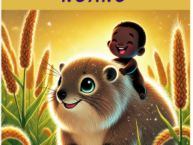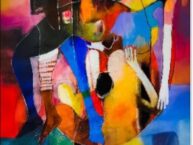“My review [of We Need New Names] is a very funny one,” says Nkiacha Atemnkeng, “but I think the funniest novel in African literature ever also deserves a funny book review.” This is more than a review. Atemnkeng presents a personal response, in honour of his his role model, NoViolet Bulawayo, the author of one of the most-talked-about African novels, We Need New Names. He traces the details of the story and offers his response to their development, following the life of Darling from Zimbabwe to the United States. He offers some insightful thoughts on the implications of the novel’s complexities. The response if accompanied by a cartoon illustration of the six young characters we meet in the first section of the novel, “Hitting Budapest”. The illustration is by cartoonist Ebesoh Dexter. You can read the essay here, but first, read about the reviewer, the cartoonist, and the novelist below:
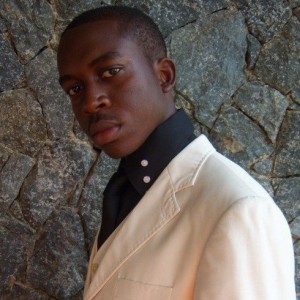 Nkiacha Atemnkeng is a young Cameroonian writer and blogger at nkiachaatemnkeng.blogspot.com. His short story “Football without a ball” was shortlisted for the 2013 Mardibooks short story competition in London. He was also a finalist for the month of October 2013 at the Africa Book Club with his children’s story, “The Golden Baobab Tree” hence was published online at africabookclub.com and is forthcoming in the anthology. Nkiacha has also been published online by malawiwrite.org, www.thenewblackmagazine.com and munyori.org. He has recently been invited to the 2014 Caine Prize Writers Workshop in Zimbabwe. A holder of a Curriculum Studies and Biology degree, he works as a Swissport customer service agent at the Douala International Airport in Cameroon.
Nkiacha Atemnkeng is a young Cameroonian writer and blogger at nkiachaatemnkeng.blogspot.com. His short story “Football without a ball” was shortlisted for the 2013 Mardibooks short story competition in London. He was also a finalist for the month of October 2013 at the Africa Book Club with his children’s story, “The Golden Baobab Tree” hence was published online at africabookclub.com and is forthcoming in the anthology. Nkiacha has also been published online by malawiwrite.org, www.thenewblackmagazine.com and munyori.org. He has recently been invited to the 2014 Caine Prize Writers Workshop in Zimbabwe. A holder of a Curriculum Studies and Biology degree, he works as a Swissport customer service agent at the Douala International Airport in Cameroon.
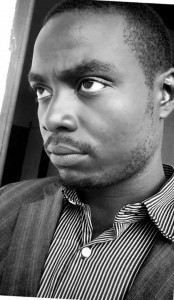 Ebesoh Dexter is a final year Medicine student at the University of Buea in Cameroon. He’s a doctor in the making and an up-and-coming cartoonist who plans to revolutionize drawing in the field of Medicine by coming up with art of the numerous Medical textbook pictures and fiction characters in general from the animated cartoon angle. He lives in Buea, Cameroon.
Ebesoh Dexter is a final year Medicine student at the University of Buea in Cameroon. He’s a doctor in the making and an up-and-coming cartoonist who plans to revolutionize drawing in the field of Medicine by coming up with art of the numerous Medical textbook pictures and fiction characters in general from the animated cartoon angle. He lives in Buea, Cameroon.
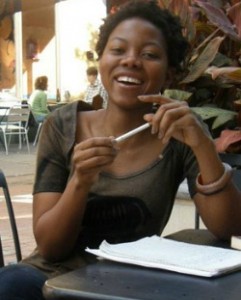 NoViolet Bulawayo was born and raised in Zimbabwe and now lives in the US. She was shortlisted for the 2009 J.M Coetzee judged Studzinski award for her short story, “Snapshots”. Her first published story, “The Watcher”, was published in Munyori Literary Journal in 2009. She later won the 2011 Caine Prize for African writing for her short story, “Hitting Budapest” which also appears as the first chapter in her debut novel, We Need New Names. It was the only African novel shortlisted for the 2013 Man Booker Prize and she is the first black African woman to achieve the feat. Her work has been published in numerous anthologies, Boston Review, Callaloo and Newsweek. She earned her MFA in Creative writing from Cornell University in 2010, where she was recognized with a Truman Capote Fellowship. She is currently a Wallace Stegner Fellow at Stanford University.
NoViolet Bulawayo was born and raised in Zimbabwe and now lives in the US. She was shortlisted for the 2009 J.M Coetzee judged Studzinski award for her short story, “Snapshots”. Her first published story, “The Watcher”, was published in Munyori Literary Journal in 2009. She later won the 2011 Caine Prize for African writing for her short story, “Hitting Budapest” which also appears as the first chapter in her debut novel, We Need New Names. It was the only African novel shortlisted for the 2013 Man Booker Prize and she is the first black African woman to achieve the feat. Her work has been published in numerous anthologies, Boston Review, Callaloo and Newsweek. She earned her MFA in Creative writing from Cornell University in 2010, where she was recognized with a Truman Capote Fellowship. She is currently a Wallace Stegner Fellow at Stanford University.
Excerpt from the personal essay:
She wrote beautiful poetic prose with a lyrical feel to it such that her writing sings as if she’s playing symphonies on a lyre. It is fierce, feral, unsentimental prose written in the first person narrative and child’s eyes of the protagonist, Darling. NoViolet uses simple language and her jokester voice, her funny and playful voice to give dimension to and shape the world of six children: Darling, Bastard, Godknows, Chipo, Sbho and Stina who live a life some people cannot even begin to imagine, very reminiscent of the refugee children in E.C Osundu’s 2009 Caine prize winning short story, “Waiting.” The novel starts with a Caine Prize winning short story itself, her 2011 Caine Prize winning short story, “Hitting Budapest” which is actually one of my favourite short stories. But it’s a slightly reworked “Hitting Budapest,” (I read it 11 times in 2011 and spotted all the new lines in this novel.) The novel is set in a shanty town, a kaka neighbourhood called…oh my God! Paradise! What a paradox! But the paradise is not nice oh! The paradise is a sprawling suburb of hell. Bulawayo’s inferno ghetto echoes with sounds of despair, reverberations of people living without any hopeful hope triggered by the repressive rule of resident president, Robert Mugabe, (Africanist stance liberation hero or Zimbabwean economy Berlin wall disintegration zero as you like.) It is a dirty smelly place full of thousands of tin shacks and no real houses.
